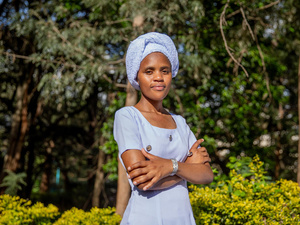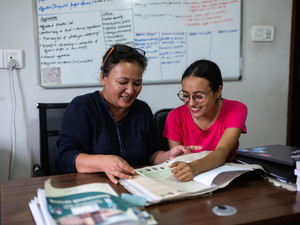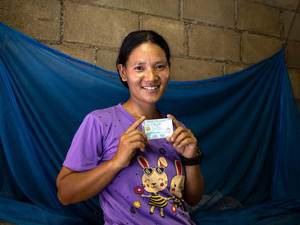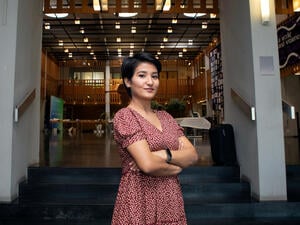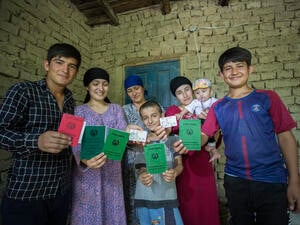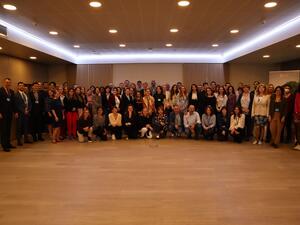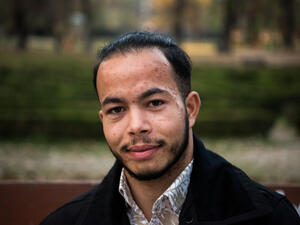Lacking a nationality, some refugees from Syria face acute risks
Lacking a nationality, some refugees from Syria face acute risks

A Syrian refugee shows UNHCR his "maktoumeen" card issued in Syria. This document, given to unregistered stateless Kurds, confers no rights or status.
AMMAN, Jordan, December 20 (UNHCR) - Sayed lives in the Kurdistan Region of Iraq with his three young children, having fled his home in Syria to escape the unrelenting violence. Like so many others displaced by the fighting, he is a refugee. But he and his family are also stateless, They are known as maktoumeen, or "unregistered," though Sayed reckons "unseen" would be a more accurate description.
The issue of statelessness - individuals who have no officially recognized nationality - is a problem for some Syrian refugees. A 2013 survey in the Kurdistan Region of Iraq found that some 10 per cent of Syrian Kurdish refugees are stateless, as many were forced to flee Syria before they could apply for nationality or were not eligible because they had never been registered by the Syrian authorities.
Tragically, the children of these stateless refugees will also inherit the condition of statelessness.
"In Syria, I could not register my marriage, even though my wife is Syrian and has her nationality document," said Jiwan, a 34-year-old stateless refugee also living in Iraqi Kurdistan. "Of course, my children are also maktoumeen," he added with a note of resignation.
As Syrian nationality law does not permit women to pass on nationality to their children, Jiwan's children have inherited his condition of statelessness. Jiwan and his wife are worried that it will prove difficult to register any children they may have while living as refugees. In order to register a new birth, all countries in the region require legal proof of marriage - which the couple was never able to obtain.
A 2011 decree allows registered stateless Kurds, called ajanib (foreigners), to apply for Syrian nationality, but obstacles remain. Those deemed "unregistered" are still barred from applying for citizenship. Even those who are eligible to apply for nationality face certain challenges.
Azar, a 45-year-old man who had been designated among the ajanib, successfully applied for nationality in late 2011, shortly after the passage of the decree. "When I got my nationality, I registered my two oldest children, aged nine and seven. They are now listed in my document," he explained.
But he could not afford to do this for all of his children, because the fee was the equivalent of about US$70 for each child. "I was not able to register them when they were born, because I was still stateless back then," he noted. The result is that while two of Azar's children are now documented as Syrian nationals, the status of the other two remains uncertain.
Even when their parents have always possessed Syrian nationality, the risk of statelessness among refugee children is particularly acute. Families frequently flee the violence with newborn or very young children without having been able to register them in Syria.
Birth registration is the right of all children under international law. It can help prevent statelessness by documenting the child's parentage and country of birth - the two factors used by states to grant nationality to a child at birth.
Birth registration also provides proof of age, which is critical for ensuring access to refugee protection aimed at children who, in the mass displacement from Syria, are at heightened risk of sexual exploitation and conscription into armed groups. By documenting a child's links with their country of origin or nationality, birth registration can also help to lay the foundation for a safe and voluntary return - if and when conditions in Syria allow.
With the goal of ensuring the registration of every Syrian refugee child born abroad, UNHCR is launching initiatives in Egypt, Iraq, Jordan and Lebanon to meet with refugee families, sensitize local authorities, and clarify registration procedures within the refugee population.
Host countries in the region are also working with UNHCR to develop a flexible approach to registering new refugee births in their territory.
By seeking to register every Syrian refugee child, the UN refugee agency is working to close a critical, if largely unseen, gap in the protection of these children and laying the foundation for their eventual return home.
A recent UNHCR report, "The Future of Syria: Refugee Children in Crisis," details the plight of Syrian refugee children in Jordan and Lebanon, including gaps in birth registration and the corresponding risk of statelessness.
By Amit Sen in Amman, Jordan

